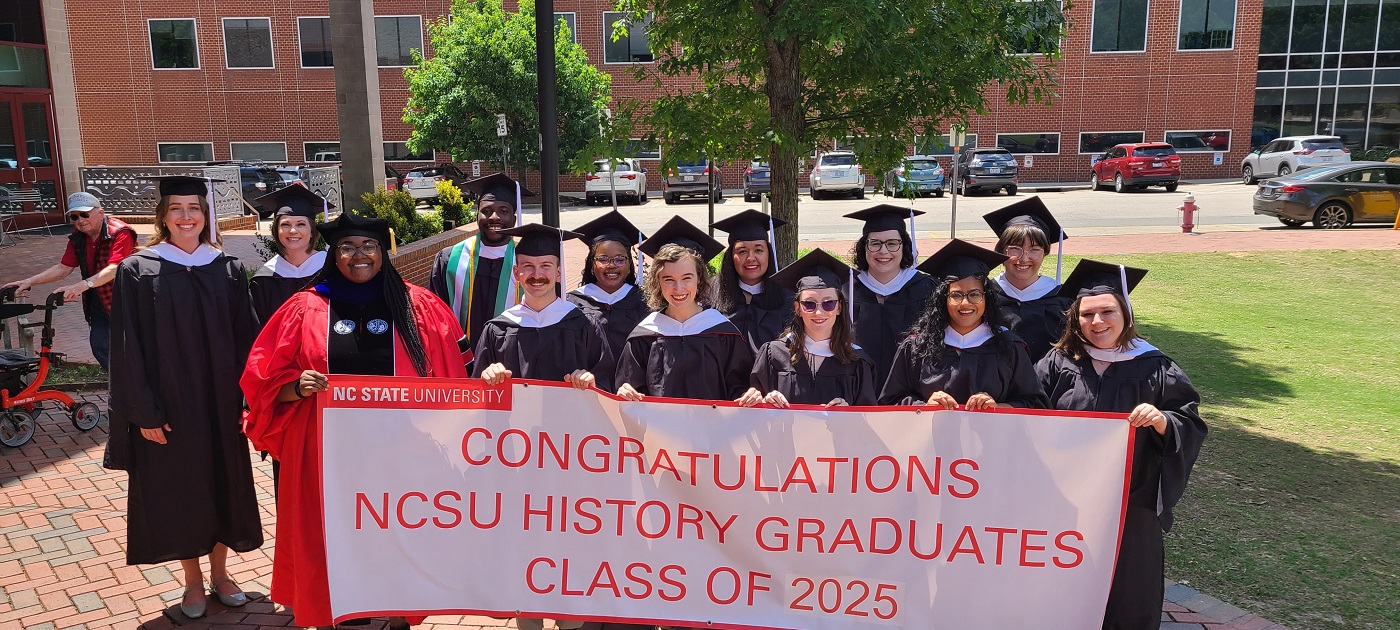Partnering to Preserve North Carolina’s Civil Rights Past
Graduate students in Dr. Alicia McGill‘s Cultural Resource Management class recently partnered with the NC Department of Cultural Resources Historic Preservation Office on an initiative to preserve North Carolina’s Civil Rights past.

Putting their historical knowledge into practice, the students connected with local preservation organizations and community leaders to identify events and places central to the Civil Rights Movement in Piedmont, North Carolina. The students conducted context studies of key local leaders and the current condition of cultural properties associated with Civil Rights activities. Students reported on the conditions of iconic NC Civil Rights sites such as the Woolsworth lunch counter in Greensboro, the Sir Walter Hotel Coffee House in Raleigh, the West End Branch of Citizens Bank and Trust of Vance County, Soul City, and Harding High School in Charlotte, as well as many more lesser known churches, hospitals, houses, civic centers, and other locations central to the Civil Rights Movement. Students presented their findings to the National Register Coordinator of the NC Historic Preservation Office and faculty from several NC State departments at a reception held on May 6, 2015. The reports the students produced will be a resource for the NC Historic Preservation Office for assessing the significance and status of specific properties in North Carolina. Additionally, these reports may contribute to the development of preservation programs in the future.
Building Lasting Partnerships and Professional Networks
Dr. Alicia McGill commented on her motivation to get students out of the classroom and into North Carolina communities.

“I chose this project to enhance student skills in historical and anthropological research and develop new ones, enable students to experience firsthand the value of collaborative multidisciplinary research, and increase student knowledge about the built environment in NC and related historic preservation concerns.” Of her decision to partner with the HPO Dr. McGill said, “This project was a great opportunity to reinforce mutually beneficial partnerships between the NC Department of Cultural Resources Historic Preservation Office and NC State University and for students to connect with heritage professionals in the state.”
Making Meaningful Contributions to the Preservation of North Carolina’s Past
Students reflected on their work with peers, professional organizations, and NC communities. Adriana Szabo, an Anthropology MA student, said that the project “was probably one of the most exciting assignments of this past academic year.” She said she was “delighted with the opportunity to do actual field research,” which benefited both her professional development as well as the communities involved. Sarah Matter, a Public History PhD student, commented on her involvement with the project. “This project provided an engaging way to learn about the Civil Rights Movement and general North Carolina History. The most important learning that came out of this project was our trip to Vance and Warren counties. It was amazing to speak with Warrenton community members. I feel that I realized what preservation means to the public and the extent to which communities feel that universities may help them achieve their goals.” The project would not have been possible without the resources and intellectual support of the NC Historic Preservation Office, especially Ann Swallow (National Register Coordinator), Claudia Brown (Branch Supervisor for the Survey and National Register Branch and Architectural Survey Coordinator), Renee Gledhill-Earley (Environmental Review Coordinator), Ansley Wegner (Research Historian), and Ramona Bartos (Deputy State Historic Preservation Officer). Dr. Katherine Mellen Charron, Associate Professor in the NC State Department of History and NC State History M.A. student, Madison Cates (class of 2015) made suggestions for historiographic resources and names of key players and places in NC civil rights activism. Additionally the Department of History and donors funded the research trips of two student groups and a reception for the presentation of final projects on May 6, 2015.
- Categories:


